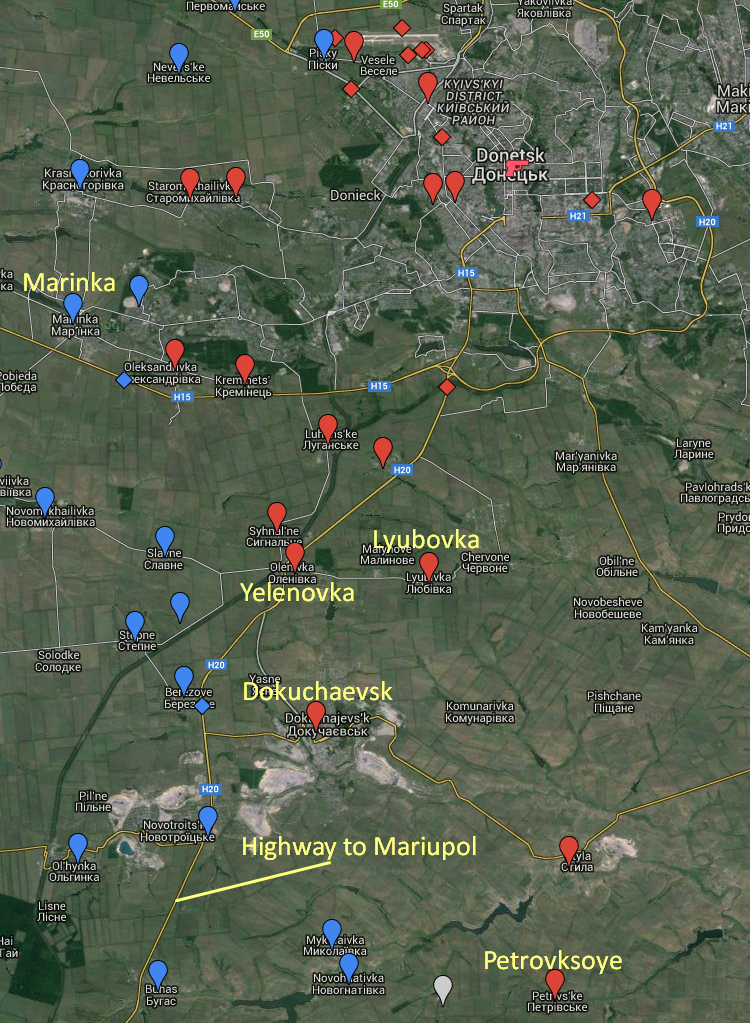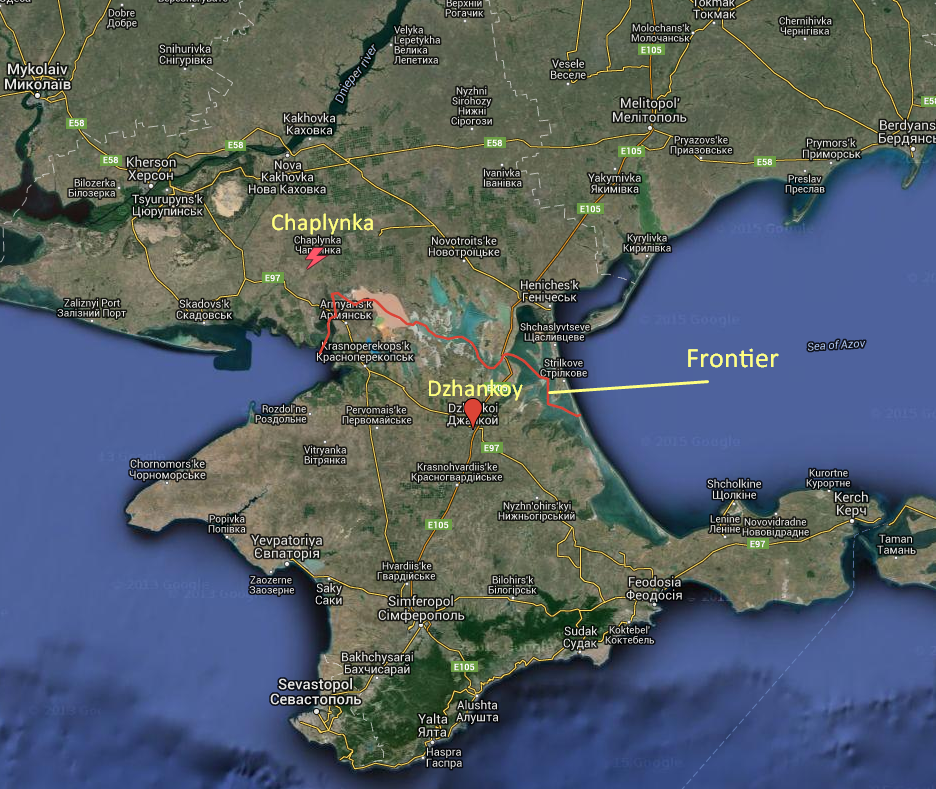Yesterday’s live coverage of the Ukraine conflict can be found here.
Please help The Interpreter to continue providing this valuable information service by making a donation towards our costs.
For links to individual updates click on the timestamps.
For the latest summary of evidence surrounding the shooting down of flight MH17 see our separate article: How We Know Russia Shot Down MH17.
- READ OUR SPECIAL REPORT: An Invasion By Any Other Name: The Kremlin’s Dirty War in Ukraine
Vira Savchenko, sister of Nadezhda, the Ukrainian military officer and now MP abducted and illegally transported to Russia where she is on trial for murder, wrote on her Facebook page today that 24 copies of a book written by her sister were seized by Russian border guards today.
“At the Verigovka-Chugunovka customs point Russia borderguards and FSB officers took 24 copies of Nadiya’s book, It’s a Strong Name, Hope,* away from me. I was carrying them at the request of Russians who are in correspondence with Nadiya in prison, as gifts for them. They were confiscated. The reason: “suspicious literature” (at first they had shouted that it was extremist literature). They also took away 18 postal envelopes with pictures of Nadya.”
* Nadezhda also means “hope.”

Vira was informed by Russian border guards on October 13 that she was barred from entering Russia for the next five years.
However she was never given any formal notice and an FSB border official told the court at Nadezhda’s trial that there was no record of such a ban.
— Pierre Vaux
last month. On November 12, we wrote in RFE/RL that there was plenty of
reason to be concerned.

Flurry Of Claims Spells Trouble For What's Left Of Ukraine Cease-Fire Regime
Far from international front pages, the situation in eastern Ukraine is once again on the verge of open warfare. While the situation around Donetsk, the capital of the Russian-backed fighters, has remained strained since the announcement of the newest cease-fire in September, with sporadic small-arms fire reported almost daily, it has deteriorated significantly in the last two weeks.
Since then, the conflict has continued to escalate. But in the last few days, there are signs of an impending explosion.
First, Russia banned Ukrainian food imports, a move which will cost both countries, but mainly Ukraine, millions of dollars. Now, there is even more strain between the two countries.
As we have been reporting, a series of mysterious explosions at electricity stations cut power to the Russian-occupied Crimean peninsula on Friday night. Protesters mainly consisting of members of the Crimean Tatars, a Muslim minority group which has been oppressed by the Russian government, and ultra-right members of Right Sector (an odd mix, to be sure) have been blocking road access to the Crimean peninsula in at least a limited way since September, but over the weekend the protesters blocked repairs of the electricity pylons, resulting in some limited clashes with police.
Today, violence has erupted on multiple fronts across the front lines (see updates below) and the Ukrainian government is pushing back against a Russian food ban and the situation in Crimea.
Today Arsen Avakov, Ukraine’s Interior Minister, suggested that the appropriate response to the Russian boycott of Ukrainian goods was to shut electricity to the Crimean peninsula. Interfax-Ukraine reports:
“I will say as a government official, not as interior minister, responding to a question of embargo on Ukrainian goods with which the Russian Federation threatened us several days ago, I think we should make a political decision at the level of the NSDC, at the level of the government to terminate the contracts for the supply of electrical power,” Avakov said at an emergency session of the Ukrainian Cabinet of Ministers in Kyiv on Monday.
Ukrainian Prime Minister Arseny Yatseniuk also suggested that Ukraine needs to respond in kind to any ban of Ukrainian goods in Russia. Reuters reports:
“There will be an analogous Ukrainian decision to launch an embargo against Russia to every Russian decision to launch an embargo against Ukraine,” Yatseniuk said.
Yatseniuk also recommended temporarily suspending cargo shipments to Crimea, the territory annexed by Russia from Ukraine last year.
Though Ukraine’s president, Petro Poroshenko, has not made a decision yet on the suggestion, a new statement published on the website of the president’s office suggests that just such a move may be a possibility:
The Ukrainian President sent a letter to the Prime Minister with an offer to immediately establish the working group on the analysis of the issue on termination of freight transport communication and trade turnover with temporarily occupied Crimea (in both directions), as well as the elaboration of respective draft decision.
The Head of State also offers to ensure temporarily termination of road and railroad freight transport communication with Crimea in both directions before the adoption of respective decision.
The President emphasizes that a priority for the Ukrainian government today is to determine a model of future relations with temporarily occupied Crimea. “Confrontation between public activists and occupational authorities of Crimea has been escalated recently. A series of criminal cases against the initiators of trade blockade of Crimea have been opened. The initiators demand full termination of trade relations with the occupied territory,” the Head of State said in his letter.
In other words, it looks as though a temporary ban on ground transport to the Crimean peninsula, occupied by the Russian military — and possibly communications — would remain for the time being.
The statement makes no mention of electricity, but it seems Crimea — and Russia — are getting a taste of what it would be like if Ukraine decides to finally play hardball and cut off assistance to the Russian-occupied peninsula.
— James Miller
The Ukrainian military reports attacks across the front line in the Donbass last night.
Colonel Andriy Lysenko, military spokesman for the Presidential Administration, announced at noon today that two Ukrainian soldiers were killed and two wounded within the last 24 hours:
Earlier today, the Lugansk Military-Civil Regional Administration announced that one Ukrainian soldier had been killed and another wounded after their vehicle struck a landmine near the village of Malinovo, outside Stanitsa Luganskaya.
According to Ukrainian military intelligence, Russian-backed forces conducted 59 attacks yesterday, while the ATO Press Centre reports 37 ceasefire violations between 18:00 last night and 6:00 this morning.
Mortar, infantry fighting vehicle, grenade launcher and small arms attacks were also reported on Mayorsk and Zaytsevo, north of Golorkva.
Today there were unconfirmed reports of further fighting, including possible use of Grad rockets, south of Donetsk, near the highway to Mariupol.
Translation: seems to me like it’s coming from the northwest. To the northeast it seems like Lyubovka
Translation: Donetsk can also hear blasts fromthe southeast but far away, difficult to make out due to the strong wind.
Translation: Yes, could hear that sh*t clearly, where exactly it fell is hard to say…
Translation: Somewhere far away. Haven’t heard it since

Meanwhile the ‘defence ministry’ of the self-declared Donetsk people’s Republic (DNR) claimed today that Ukrainian forces shelled northern areas of Donetsk, the outskirts of Gorlovka and separatist-held areas of Shirokino last night.
According to the DNR, the Spartak area of Donetsk was subjected to fire from tanks and mortars until midnight, with small arms fire continuing until the morning.
The separatists accuse Ukrainian forces of using tanks to shell Gorlovka and 120 mm mortars to bombard Shirokino.
— Pierre Vaux
Following the destruction of power lines leading from Ukraine’s Kherson region into Russian-occupied Crimea on Friday night, the situation on the frontier remains tense.
Police, supported by National Guard troops gained access to the site of the ruined pylons near Chaplynka after negotiations and clashes with protesters on Saturday. However another blast went off as engineers worked to repair the power lines.
On Sunday, a second attempt to clear protesters resulted in failure, with one journalist and one police officer injured during clashes.
As of 5 GMT today, Russia’s state-owned TASS news agency reported that 1.66 million people remained without electricity in Crimea, where a state of emergency has been declared.
This morning Ilya Kiva, head of the Interior Ministry Narcotics Department and commander of the law enforcement response to the power line damage, told Ukraine’s 112 television channel that the Russian army had moved personnel and equipment to the frontier.
Leviy Bereg reports (translated by The Interpreter):
“While the pylons have been knocked out, the Russian army has moved right up to the line of contact. Grad multiple-launch rocket systems have been driven up and paratroopers placed at all three crossing points. We know that Russian troops have been brought up to combat readiness. We’re doing out best to be ready for any development of events,” said Kiva.
He also said that in the Dzhankoy area, 12 Russian tanks have moved up to the border with the Kherson region.

— Pierre Vaux